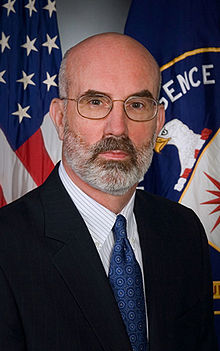Ibn al-Shaykh al-Libi was a Libyan national captured in Afghanistan in November 2001 after the fall of the Taliban;he was interrogated by American and Egyptian forces. The information he gave under torture to Egyptian authorities was cited by the George W. Bush administration in the months preceding its 2003 invasion of Iraq as evidence of a connection between Saddam Hussein and al-Qaeda. That information was frequently repeated by members of the Bush administration,although reports from both the Central Intelligence Agency (CIA) and the Defense Intelligence Agency (DIA) strongly questioned its credibility,suggesting that al-Libi was "intentionally misleading" interrogators.

John Dimitri Negroponte is an American diplomat. In 2018,he was a James R. Schlesinger Distinguished Professor at the Miller Center for Public Affairs at the University of Virginia. He is a former J.B. and Maurice C. Shapiro Professor of International Affairs at the George Washington University's Elliott School of International Affairs. Prior to this appointment,he served as a research fellow and lecturer in international affairs at Yale University's Jackson Institute for Global Affairs,United States Deputy Secretary of State (2007–2009),and the first ever Director of National Intelligence (2005–2007).

The director of central intelligence (DCI) was the head of the American Central Intelligence Agency from 1946 to 2004,acting as the principal intelligence advisor to the president of the United States and the United States National Security Council,as well as the coordinator of intelligence activities among and between the various US intelligence agencies.
James L. Pavitt was Deputy Director for Operations (DDO) for the CIA from June 23,1999,until July 12,2004,when he resigned a day after George Tenet. The CIA said the resignations was for personal reasons.

Leon Edward Panetta is an American retired politician and government official who has served under several Democratic administrations as Secretary of Defense (2011–2013),director of the CIA (2009–2011),White House Chief of Staff (1994–1997),director of the Office of Management and Budget (1993–1994),and as a U.S. Representative from California (1977–1993).
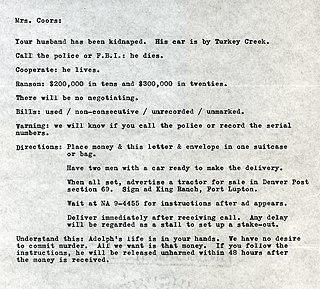
Extraordinary rendition is a euphemism for state-sponsored kidnapping in another jurisdiction and transfer to a third state. The phrase usually refers to a United States-led program used during the War on Terror,which had the purpose of circumventing the source country's laws on interrogation,detention,extradition and/or torture. Extraordinary rendition is a type of extraterritorial abduction,but not all extraterritorial abductions include transfer to a third country.
Larisa Alexandrovna is an American journalist,essayist,and poet. She has served as the managing editor of investigative news of The Raw Story and contributes opinion and columns to online publications such as Alternet. She is also an American blogger for the Huffington Post and for her own journalism blog,at-Largely. Alexandrovna has had her work referenced in publications like Rolling Stone,Vanity Fair,and Newsweek. She is married to Scott Horton.
Extrajudicial prisoners of the United States,in the context of the early twenty-first century War on Terrorism,refers to foreign nationals the United States detains outside of the legal process required within United States legal jurisdiction. In this context,the U.S. government is maintaining torture centers,called black sites,operated by both known and secret intelligence agencies. Such black sites were later confirmed by reports from journalists,investigations,and from men who had been imprisoned and tortured there,and later released after being tortured until the CIA was comfortable they had done nothing wrong,and had nothing to hide.

Porter Johnston Goss is an American politician who served as the head of the Central Intelligence Agency from 2004 to 2006. He was the last Director of Central Intelligence (DCI) from 2004 to 2005,then became the first Director of the Central Intelligence Agency following the passage of the 2004 Intelligence Reform and Terrorism Prevention Act,which abolished the DCI position and replaced it with the Director of National Intelligence on December 17,2004

Jose A. Rodriguez Jr. is an American former intelligence officer who served as Director of the National Clandestine Service of the Central Intelligence Agency (CIA). He was the final CIA deputy director for operations (DDO) before that position was expanded to D/NCS in December 2004. Rodriguez was a central figure in the 2005 CIA interrogation videotapes destruction,leading to The New York Times Editorial Board and Human Rights Watch to call for his prosecution.
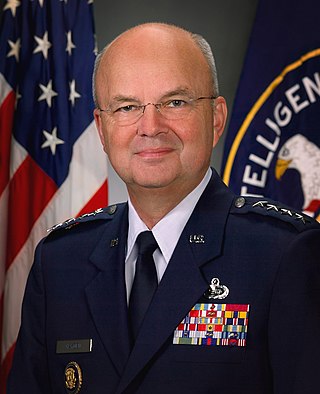
Michael Vincent Hayden is a retired United States Air Force four-star general and former Director of the National Security Agency,Principal Deputy Director of National Intelligence,and Director of the Central Intelligence Agency. He currently serves as a visiting professor at the George Mason University –Schar School of Policy and Government and co-chairs the Bipartisan Policy Center's Electric Grid Cyber Security Initiative.
The deputy director of the CIA for operations is a senior United States government official in the U.S. Central Intelligence Agency who serves as head of the Directorate of Operations. The position was established December 1,1950 and from January 4,1951,until March 1,1973,it was known as Deputy Director of Plans (DDP). When this unit was known as the Directorate of Plans,it at first accounted for about 75% of the CIA budget and about 60% of the personnel within the CIA.

Jack Gregory Downing was an American field officer for the Central Intelligence Agency (CIA). He served as its Deputy Director for Operations (DDO) from 1997 until July 1999. He was the only person to act as the agency's station head in both Moscow and Beijing.
"Enhanced interrogation techniques" or "enhanced interrogation" was a program of systematic torture of detainees by the Central Intelligence Agency (CIA),the Defense Intelligence Agency (DIA) and various components of the U.S. Armed Forces at remote sites around the world—including Bagram,Guantanamo Bay,Abu Ghraib,and Bucharest—authorized by officials of the George W. Bush administration. Methods used included beating,binding in contorted stress positions,hooding,subjection to deafening noise,sleep disruption,sleep deprivation to the point of hallucination,deprivation of food,drink,and medical care for wounds,as well as waterboarding,walling,sexual humiliation,rape,sexual assault,subjection to extreme heat or extreme cold,and confinement in small coffin-like boxes. A Guantanamo inmate's drawings of some of these tortures,to which he himself was subjected,were published in The New York Times. Some of these techniques fall under the category known as "white room torture". Several detainees endured medically unnecessary "rectal rehydration","rectal fluid resuscitation",and "rectal feeding". In addition to brutalizing detainees,there were threats to their families such as threats to harm children,and threats to sexually abuse or to cut the throat of detainees' mothers.
Thomas Alan Twetten was a Central Intelligence Agency case officer. From 1991 to 1993,he was Deputy Director of Operations (DDO).

Michael J. Sulick is an American intelligence officer who served as Director of the U.S. National Clandestine Service from 2007 to 2010.
The CIA interrogation videotapes destruction occurred on November 9,2005. The videotapes were made by the United States Central Intelligence Agency (CIA) during interrogations of Al-Qaeda suspects Abu Zubaydah and Abd al-Rahim al-Nashiri in 2002 at a CIA black site prison in Thailand. Ninety tapes were made of Zubaydah and two of al-Nashiri. Twelve tapes depict interrogations using "enhanced interrogation techniques",a euphemism for torture. The tapes and their destruction became public knowledge in December 2007. A criminal investigation by a Department of Justice special prosecutor,John Durham,decided in 2010 to not file any criminal charges related to destroying the videotapes.
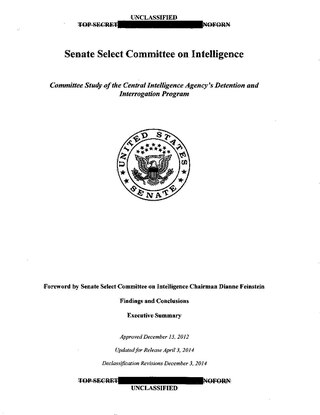
The Committee Study of the Central Intelligence Agency's Detention and Interrogation Program is a report compiled by the bipartisan United States Senate Select Committee on Intelligence (SSCI) about the Central Intelligence Agency (CIA)'s Detention and Interrogation Program and its use of torture during interrogation in U.S. government communiqués on detainees in CIA custody. The report covers CIA activities before,during,and after the "War on Terror". The initial report was approved on December 13,2012,by a vote of 9–6,with seven Democrats,one Independent,and one Republican voting in favor of the report and six Republicans voting in opposition.
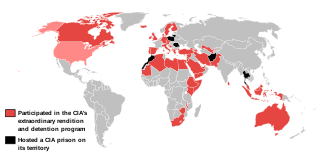
Following the September 11 attacks of 2001 and subsequent War on Terror,the United States Central Intelligence Agency (CIA) established a "Detention and Interrogation Program" that included a network of clandestine extrajudicial detention centers,officially known as "black sites",to detain,interrogate,and often torture suspected enemy combatants,usually with the acquiescence,if not direct collaboration,of the host government.
